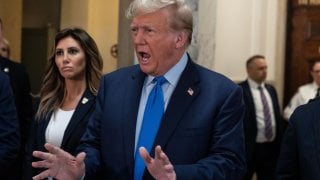Donald Trump and Joe Biden’s Hidden Agreement
Despite the apparent policy gulf between the two presidential candidates, both harbor nearly identical protectionist instincts.
The 2024 presidential contest is already in general election mode, as President Biden and former President Trump, barring a health scare, have forced a rematch from 2020. Voters are re-evaluating their choices regarding what each candidate has to offer on key issues like immigration, healthcare, and foreign policy. However, there is one big area of compromise between both campaigns: economics.
Specifically, both candidates have shown demonstrable hostility to America’s longstanding international trade policy. Our preference for free trade between nations allows the United States to sell what we produce at a competitive advantage while also buying goods others can manufacture for us to get an economic edge. One economist described free trade as the best antidote to international plunder and violence, the status quo for most of human history.” Sadly, Trump and Biden do not see it that way.
During his first term, President Trump imposed a $300 billion tariff on Chinese goods, which the Biden administration has left chiefly intact. The Tax Foundation revealed that this amounted to an $80 billion tax increase on Chinese products. Trump is now proposing a new 100 percent flat tariff on all Chinese vehicle imports and vehicles made south of the border. Earlier in the year, he considered a 10 percent trade tariff on all other countries, including close allies.
The problem with these trade restrictions is that they have—and will—increase American prices while halting production at home. The price is always passed on to the American consumer and has continued into Biden’s administration’s trade policies.
Two of President Biden’s signature achievements are a big blow to free trade and the American worker in the Inflation Reduction Act (IRA) and the CHIPS Act. Both passed Congress to lower the deficit and increase domestic semiconductor production, respectively. However, a new study shows that the IRA may balloon the deficit far beyond its means. Similarly, the CHIPS Act is bogged down by progressive ideological projects while sending billions in subsidies to already well-off companies.
Biden’s latest economic error involves weighing in on the sale of U.S. Steel to Japanese-based Nippon Steel. The merger is mutually beneficial to both Japan and U.S. steelworkers. Nippon plans to invest $1.4 billion and upgrade its technology, which will create more job opportunities and allow wages to increase.
Biden’s objection to the deal is purely political. This November, he is siding with the steel union. Never mind the advantages the Nippon deal will give the U.S. economy while strengthening our Pacific partnership with Japan.
The threat to economic liberty posed by a president using the bully pulpit to shut down a trade deal between two private companies is even more dangerous. Biden claims his opponent threatens the rule of law, but a president blocking this trade deal erodes norms nonetheless. Of course, Trump pledged to block the deal “instantaneously” if he wins the election. It’s just further evidence of protectionism becoming the dominant paradigm of both candidates.
On the campaign trail, President Biden has repeatedly argued that his candidacy is “protecting our democracy.” While keeping our constitutional Republic that the Founders built is of the utmost importance—it has stood the test of time for over 250 years—the real scare is ensuring the U.S. economy is still a free enterprise system that can produce prosperity untethered from government regulation.
Unfortunately for voters, the economic conditions are less than ideal. Despite China declining by just 65 percent for the second straight year and the U.S. economy growing 3.2 percent, the data points away from a “soft landing” and more towards an economic recession. AEI economist Michael Strain highlights the slowdown of machinery and raw materials, which hurts business growth. Consumer confidence is low due to high prices and interest rates. When consumers don’t spend due to fear of current finances, this impacts business demand and forces layoffs.
According to a 2022 survey, only 21 percent of Americans view our free enterprise system positively. America’s economic future needs a shared agreement on the importance of our capitalist system and trade policy, which have made America the most prosperous country in the world. Voters must pressure Trump and Biden to stop the destructive protectionist policies and let free trade work.
Alex Adkins is a graduate of Benedictine University who has written for the Washington Examiner, the Daily Caller, the American Spectator, the American Thinker, the Federalist, and the Western Journal.
Image: Shutterstock.com.

